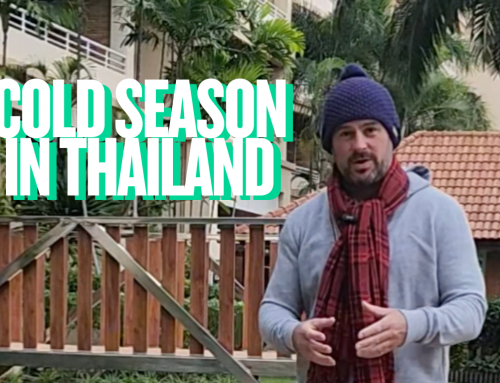This guest post is written by Tom Tuohy, who has written for various media from The Guardian (UK), Bangkok Post (Thailand) to Al Jazeera (Qatar). Tom wrote this in follow up the Thaivisa Expat survey that revealed something many of us had been observing for the last few years – that many Western Expats are now leaving Thailand.
So long Thailand, it’s time we were heading home
By now many will have read and digested the news from the biennial Thaivisa.com survey that a growing number of Western expats are not happy in the Land of Smiles.
For some, this is not exactly news although, for others, it has come as quite a shock. Those brave enough to click on links to Thaivisa.com pages won’t be strangers to the typically negative comments generated on this website and indeed, many other Thailand expat discussion forums.
If one were to hazard a guess at the general make up of your typical commenter, one might get the image of a forever disgruntled middle-aged, divorcee who sits in his underwear in his 40 square metre condo, fag in one hand, Leo in the other, hunt and peck style (two-fingered) typing, moaning about his lot and never quite able to find it in his heart to say nice things about his adopted home.
Expat suicide? “Nah, he deserved it…for shacking up with a bar girl” or “How inconsiderate to have splattered his brains all over Uncle Suprarerk’s Honda from the fifth floor!” Such is the quality of comments one reads below a link to the sad demise of a recent fellow expat and rarely a word of remorse or pity let alone an RIP graces those boards. Thankfully, these expats do not represent the many thousands of Western expats in Thailand.
In fact, these expat forums seem to be where the most depressed and pessimistic farangs come to congregate if for no other reason than to wallow together in their own support group. Presumably this is the only way to help them get through their own sad existences in the tropical paradise that is Thailand.
That said, it does appear, in this instance, the “Old Groaners” (as I like to call them), have been right about how many expats want to leave Thailand or have already left. So what’s gone wrong? Why are so many expats leaving the paradise that is Thailand? And just as important, where are they all going?
“You seek him here, you seek him there…” (The Scarlet Pimpernel)
According to the survey, which had 1,429 respondents, so quite a sizeable group, there are fewer Western expats arriving in Thailand than ever before and a significant amount of working expats under 60 years have now left Thailand for good. Moreover, half of all expats have considered leaving the country over the last year, and of the group that has considered leaving, a whopping 84% said they are unhappier than when they first arrived.
Also, the newer arrivals have not been the young bucks, the “hansum man”, so beloved of Thai language schools, but have been retirees, with the average age increasing a mammoth ten years from 50 to just over 60 years old in just two years.
Only 1 in 5 expats is now under the age of 50 and only 2% under 30 years old. Back in 2016, when the last survey was taken, 10% were under the age of 30 and 33% were under 50 years old. It seems too that the writing was clearly on the wall two years ago, so it shouldn’t really have come as much of a surprise. When asked then, ‘Are you happier than when you first arrived?’, 39% said they were not and 44% of this group of respondents came from the under 60-year old group of working expats who said that financial pressure was the main reason for their unhappiness.
Indeed, expat finances is another revealing piece of news that came out of the survey and which I personally found quite surprising. Apparently, many expats are now living on between 25,000-45,000 THB a month. The latter figure is just over 1,000 British pounds a month and would barely get you a garden shed to rent in London, so it’s somewhat incredible to hear that so many are able to live on this amount and that’s at the higher end! If the survey is accurate, the vast majority of expats are living on this amount, or much lower, which really does conjure up new images of “amazing” in that old trope Amazing Thailand!
Long gone, it seems, are the days when Western expats would have enough money in their pockets to be out partying all night, grab a geng keeow waan gai on the way home, after paying a bar fine and, after a night’s intra-cultural exertions, stroll into Piccadilly Language School the next day smelling like a Soho brewery on a Monday morning and looking like they had gone 12 rounds with Vidal Sasoon’s hairdryer, and lost.
Indeed, if this news is indeed true, there must also be an inordinate number of Thai mothers going without emergency, lifesaving operations in Isaan (อีสาน) and a lot of arable farmers having to miss the latest auction to buy a new buffalo if these young buck expats are no longer able to spread their wealth around and support the locals.
Why have they left?
Thailand and the expat scene really has changed monumentally over the years and with all the changes to visas, the dreaded 90-day reporting, previously at Soi Suan Phlu near Sathorn, but now requires a trek to Laksi which takes the better part of a whole morning if you live in Bangkok. A friend recently told me that in Chiang Mai he has to get up at 4am every time he needs to do the 90-day report at Thai immigration and often doesn’t leave their offices till 4pm.
The introduction of the Thai Culture courses and the teaching licences were also deeply unpopular and perceived by many as cash cows designed solely to milk the new farangs out of more cash as were and still are the dual pricing shenanigans at national parks and Thai museums.
The high cost of living no doubt dissuaded others from staying as well. Having been out of Thailand working in the Middle East for the last 10 years and only popping back to Thailand during the summer months of July and August, I can attest to the sharp increase in prices nowadays. Hear ye! Hear ye! Thailand is not cheap any more, especially as it’s harder and harder to find affordable street food (which I wrote about for the South China Morning Post) and Bangkok, Chiang Mai and Pattaya are fast becoming as expensive as any other major tourist city.
The dangers of the roads can’t be ignored either as the World Health Organisation placed Thailand at number two most dangerous with only Libya above Thailand. I just finished and submitted a 1,500-word article for the South China Morning Post on the recent boat accident, the worst in Thailand’s maritime history, where 47 Chinese nationals drowned but there are many equally horrific stories of deaths on Thai roads. You can read it here – hot off the press!
Go through the archives of ajarn.com and you’ll find my previous blog on this very subject in 2014 e.g. the perilous dangers of getting around in Thailand. It’s no wonder so many younger expats have said “enough is enough” and quit Thailand and/or moved on to places more friendly and/or safe like Cambodia, Vietnam, the Philippines and Malaysia.
According to The Chiang Rai Times, “As for reasons why the country is becoming less popular as an overall expat destination, the influx of Chinese is high on the list, followed by a strong belief that Westerners are no longer welcome in the Land of Smiles. Increased costs across the board are hitting many retirees where it hurts, as is the high baht, and restrictions on previously open-all-hours entertainment venues are as unpopular with younger expats as they are with tourists.
Changes to visa regulations and also to the perceived attitudes of some immigration departments aren’t helping, with a significant number of older expats leaving for other Southeast Asian countries as a result.” (from https://www.chiangraitimes.com/expat-survey-suggests-thailands-popularity-with-western-expats-is-fading.html )
As my Thai publisher pointed out to me also, one reason why there is a big disparity between the lower numbers of young Western expats now in Thailand and an increase in the older retirees is not only to do with the high baht, but also to do with the drop in pensions across the board, certainly since the last global economic crash in 2008.
Many pensioners simply can’t afford to return to their home countries as their pensions would not be enough to live on. This is especially true of European and British expats now living in Thailand. Since Brexit in June, 2016, the value of the British pound has gone down about 30%, so pensioners relying on that money have to make do with 30% less in their pockets. A similar story holds for German, French, Dutch and other European expats who’ve seen the Euro slide to the floor like a drunkard at the end of a two-day bender.
One cannot of course forget the huge influx of Indian and Chinese visitors many of whom have set up businesses in the Land of Smiles over the last few years. Those long term Western expats with businesses in Thailand have had to compete for an ever dwindling revenue of disposable income from other tourists and, especially in the case of the Chinese with their Zero Dollars tours, that is very hard to come by as the Chinese typically only buy from their own and spend money in hotels and shops owned by Chinese proxy companies.
Where are they all going?
As I mentioned, many have quit Thailand and moved on to places more friendly and/or safe like Cambodia, Vietnam, the Philippines and Malaysia. The 2017 edition of “Expat Insider”, a survey issued annually by the world’s largest expat network, InterNations, shows a flattering result for three Southeast Asian nations that rank high in popularity for expats: Singapore, Vietnam and Malaysia which ranked 9th, 10th and 15th respectively on a global 65-nations list of attractiveness for expats.
Factors considered include quality of life, working abroad, ease of settling in, family life, infrastructure, language capabilities, costs and personal finance, and it also considered the different inspirations for why expats move abroad. Thailand came in at 18, somewhat behind all three which speaks volumes.
According to another survey, the International Living – Annual Global Retirement Index, 2017 , listing what it claims to be the best place in the world to retire in, ranks 24 countries according to ten criteria including healthcare services, infrastructure, the ease of obtaining and keeping a long-stay visa, the cost of living, and more.
This survey stated Malaysia was the best place to retire in Asean and the sixth best place in the world to retire to. Mentioning Thailand, it said that while once a hugely popular destination for retirees, it has lost its shine because of visa and residency restrictions, increasing cost of living and other reduced benefits. “Even Thailand’s highly promoted healthcare sector failed to impress. Ranked eight points below Malaysia, equivalent to that in the Philippines, which was ranked as the fourth best place to retire to in Asean and the 19th best place in the world to retire to.”, it said. Ouch!
Ramifications?
What does this all mean for Thailand? It’s fairly obvious that if a nation’s tourists, long or short term, decide to go elsewhere and the demographics change so radically as we see here in Thailand with Chinese and Indian visitors replacing mostly westerners, there will be a downside somewhere.
For a start, given that Thailand regularly has one of the lowest annual PISA scores (Programme for International Student Assessment) for English, and many young British and other native speaking teachers are no longer residing and thus teaching English in Thailand, it’s fairly safe to say that the general level of English among Thais is unlikely to improve. Remember too that with Thailand now an active member of the Asean bloc, it competes with all the other Asean member states for skilled workers and good English language skills have a very real and tangible market value in the region because of it.
It is well known too that of the remaining young westerners still residing in Thailand, many have turned to teaching Chinese kids online instead of face to face Thai students. The reason is because they can make as much as 70,000 THB as opposed to 35,000-45,000 teaching Thais and they can also avoid the hoop jumping in having to get a Thai work permit and possibly also a teaching licence as well as take a Thai Culture course all of which are not cheap but which the farang is generally expected to pay for.
A quick anecdote will suffice to show another reason why Thais generally prefer Western expats. I was driving to Sattahip to visit the in-laws a few days ago, and I had Radio Thailand on in the car. You know, the Government English language channel that sounds like it hasn’t changed since the 1950s complete with Dick Barton soundtrack and presenters who sound like they have half an apple in their mouths when speaking (given the way they seem to over pronounce every syllable): “Gooood moooorrrnniingg, thiiiis isss Raaaaadioo Thaiilaaaand”. The host and his guests were discussing tourism and one of the guests said the following:
“Over the last 8-9 years we have seen many visitors return and we have about 64% of them who are repeat visitors because of the contact they have either with the place or the people. Sometimes it’s just with the vendors across the street or hotel or resort they were staying at and they have a chat with the person who sold them a coconut drink or quit deeow (noodles) and they enjoy coming back and seeing the people they met last time if they’re still there and a lot of time they say it’s a beautiful relationship between the people, the place and the group and it’s the friendliness and the hospitality of the Thai people that are its greatest asset.”
I mention this because they were extolling the virtues of how Thai people are so friendly which of course they are and how they love to build a relationship and chat with their farang guests…in English. I wonder how many conversations are had like that with Chinese visitors? I think you get my point.
In fact, as a government, you have to ask yourself which you’d prefer long term: tourists who come to the country, but rarely mingle with local Thais, stay in their own groups, are known to be noisy and rarely tip, do their shopping mostly in shops owned by their compatriots (or by proxy) and where a large chunk of the revenue goes back to the visitor’s country?
Or would you prefer to court more Western expats who by and large, mingle with their hosts or at least try to, spend a large chunk of their Thai Baht salaries and revenue from their businesses in Thailand, put their kids in international schools and bring a vast array of soft skills to the country?
For me it’s a no brainer, but hey, what do I know!
Tom Tuohy recently retired from teaching and is now a full time writer. He has written for a number of newspapers, magazines and websites including: The Guardian (UK), Al Jazeera (Qatar) the EL Gazette (UK), jobs.ac.uk (UK), The Bangkok Post (Thailand), and the South China Morning Post (Hong Kong).
His book – “Watching The Thais” – is out now! – You can buy it in Asia Books and Kinokuniya in Bangkok as well as on Amazon. The cheapest way to buy it though is here: in paperback and also in ebook forms: epub, mobi and .pdf all at 99 THB.
You can get the book via www.watchingthethais.com
Let Dan know where you need help and he will send you recommendations and help you get set up
Subscribe to Newsletter











Excellent article, as always Dan, I will share this on Facebook.
How can obtain a copy of “Watching The Thais” in epub for 99 baht?
http://www.watchingthethais.com/
The survey results are no doubt accurate and ex-pat Westerners are leaving Thailand in droves.
Appallingly bad press about overall safety standards in the country does not encourage tourists from holidaying in the country also,
The bottom line is, however, do those in authority in Thailand really care?
‘Go through the archives of ajarn.com and you’ll find my previous blog on this very subject in 2014 e.g. the perilous dangers of getting around in Thailand”
Blog no longer exists.